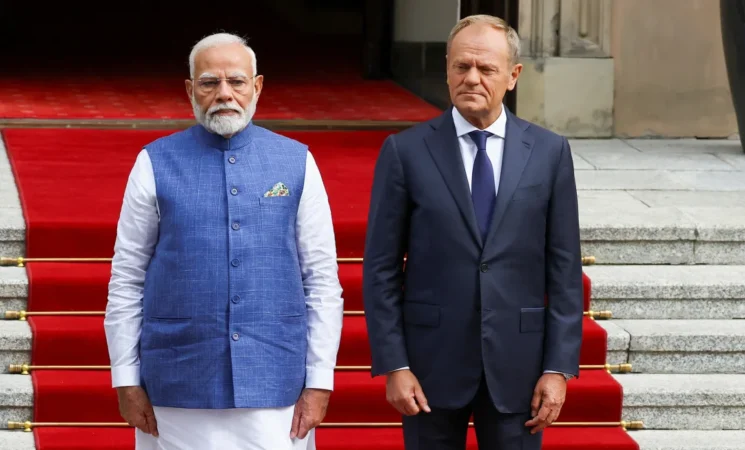30 August 2024, NIICE Commentary 9471
Bhawna
Recently, the Indian Prime Minister Narendra Modi visited Poland on 22nd of August 2024 to meet his counterpart Donald Tusk which officially marked the 70th anniversary of the bilateral ties between the two countries. This visit of PM Modi has been particularly considered as momentous by many experts and leaders because it is the first time that an Indian Prime Minister visited Poland in a span of 45 years. The former Indian President Pratibha Patil had last visited Poland in 2009. PM Modi’s visit can be decoded from different focal points and has been significantly critical in strengthening the previously established diplomatic bilateral relations between India and Poland given the present geo-political global scenario.
Historically, both India and Poland have been sharing some common cultural values and economic interests that have been an important aspect of their established relationship for the past 70 years. But in the present scenario, this particular visit would certainly contribute towards transforming their bilateral connection into a ‘strategic partnership’. In fact, ahead of his visit to Poland, PM Modi said that Poland was India’s major economic partner in Central Europe. During the meeting between the leaders, they discussed on a wide range of issues such as regional security, the current situation in war-torn Ukraine, defence, cybersecurity, trade and investment, cultural association and people to people connect.
Both the leaders have also recognized several areas of convergence and significant opportunities in the domain of urban infrastructure, water, solid waste management, renewable energy, AI, electric vehicles etc. They also talked about the legacy of Maharaja of Jamnagar and the royal family of Kolhapur in order to express the unique bond shared by the two countries and the importance of cultural ties. However, the primary concern remains to be the prolonged crisis of Russia-Ukraine and restoration of peace and stability in the region as these have some severe regional as well as global security implications in the long-run.
Evidently, over the last several years, the world has been witnessing many regional as well global challenges. One of the most serious issue has been the Russia-Ukraine crisis after the full-scale invasion of Ukraine by Russia in February 2022. This has further complicated the regional dynamic sat various levels.
India, being one of the largest democracies in the world has been a staunch advocate against human rights violations. India has also been strongly committed towards establishing a rule-based international order through deeper engagement and cooperation with the countries around the world through expanding bilateral ties with them.
This visit of the Indian Prime Minister to Poland holds immense significance in terms of India’s changing geo-strategic national interests. It has been viewed by many scholars and world leaders as an excellent diplomatic maneuver particularly amidst the ongoing Russia-Ukraine crisis which has been the growing concern for the entire international community.
The geo-political situation between Russia-Ukraine has been gradually deteriorating which is negatively impacting the entire European region. It has led to regional as well as global instability and chaos. Russia, being the all-weather friend of India is concerned for its own security interests primarily because of the NATO’s eastward expansion. On the other side, Ukraine, historically a part of former Soviet Union, has shown interest in joining the NATO alliance soon which in turn further triggered Russia. Moreover, Poland as an independent country sharing its borders with both Russia and Ukraine, will also be having security and economic concerns in the region.
In the present context, both India and Poland share some common economic and security interests that have been comprised due to prolonged conflict between Russia and Ukraine. This is again hampering the growth prospects in the region. In order to pacify the current situation between the two by either conducting peace talks or diplomacy, India has been actively engaging with several countries bilaterally as well as multilaterally with the intention of resolving this crisis and restoring peace in the region.
In order to safeguard her own interest in the region, India has decided to revisit its already established relationship with Poland being a neighboring country of both Russia and Ukraine and upgrade the relationship to the level of ‘strategic partnership’. It will not only benefit both the countries but will have an overall positive global impact in the coming years given the current geo- political landscape. In fact, both the sides have launched a joint five-year action plan (2024- 2028) in order to fully realize the true potential of their newly emerging ‘strategic partnership’.
Furthermore, the role of culturally diverse Indian diaspora in Poland has also paved the way for deeper cooperation and collaboration at several levels of health, research, science, education and so on. The defense sector has also emerged as a new area of deeper engagement in order to further strengthen and consolidate the launch of the new strategic partnership by navigating new opportunities and areas of convergence.
We can clearly witness a remarkable shift in India’s foreign policy approaches over the years towards different countries without compromising her own strategic interests. India has had a distinct set of interests and different set of approaches in order to fulfill these interests independent of any event while still propagating the philosophy of “Vasudhaiva Kutumbakam”- the world is one family.
Bhawna is Research Scholar at Centre for International Politics, Organization and Disarmament (CIPOD), School of International Studies, Jawaharlal Nehru University, New Delhi.

